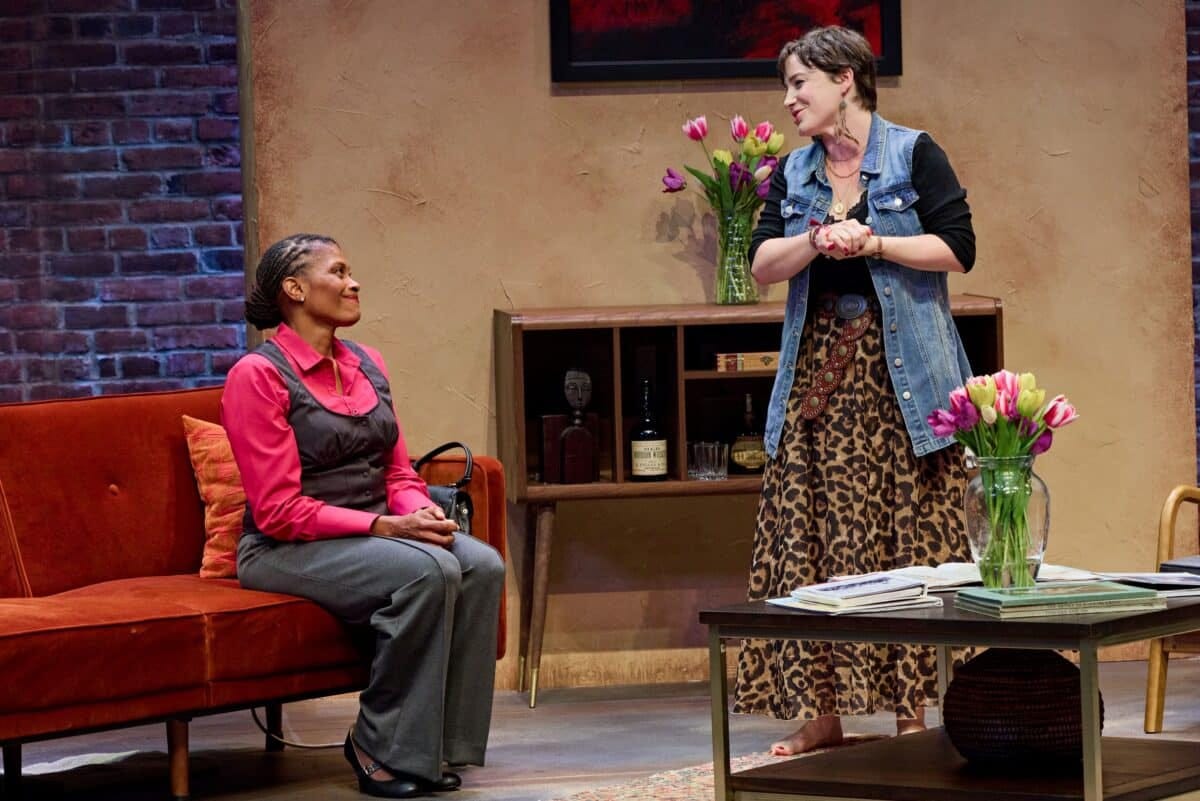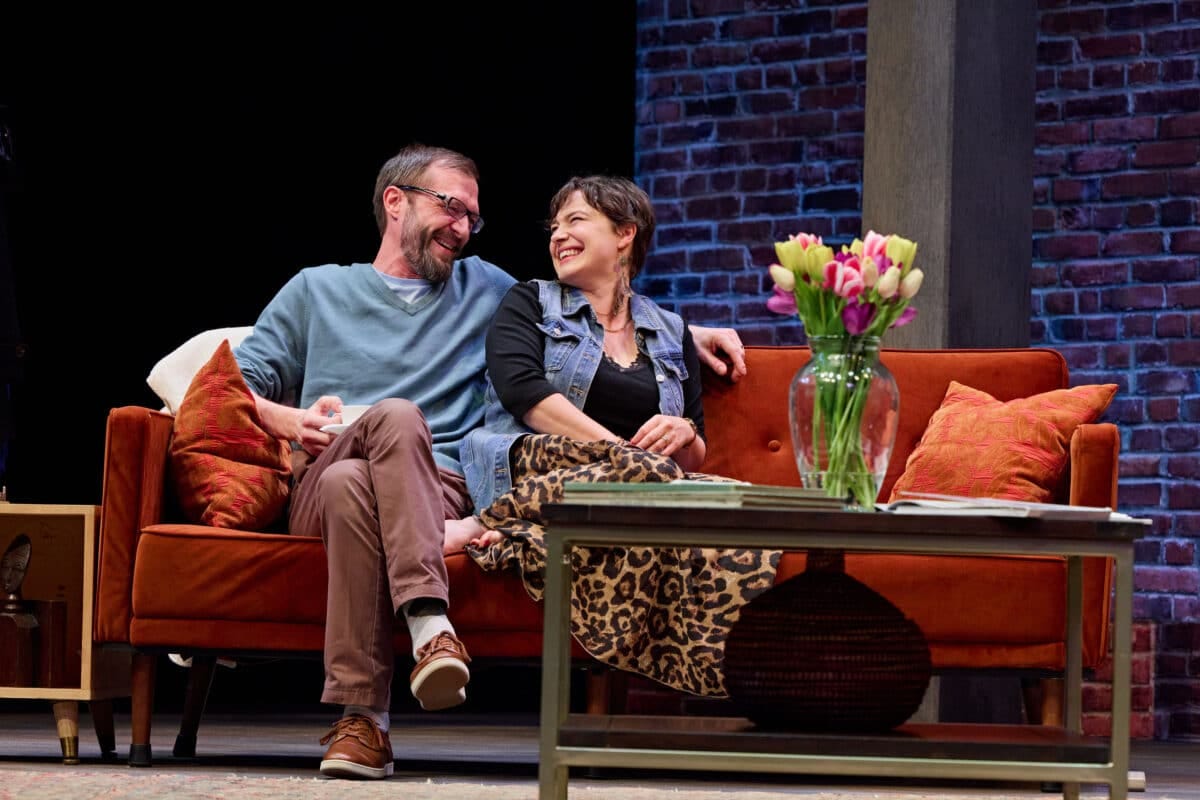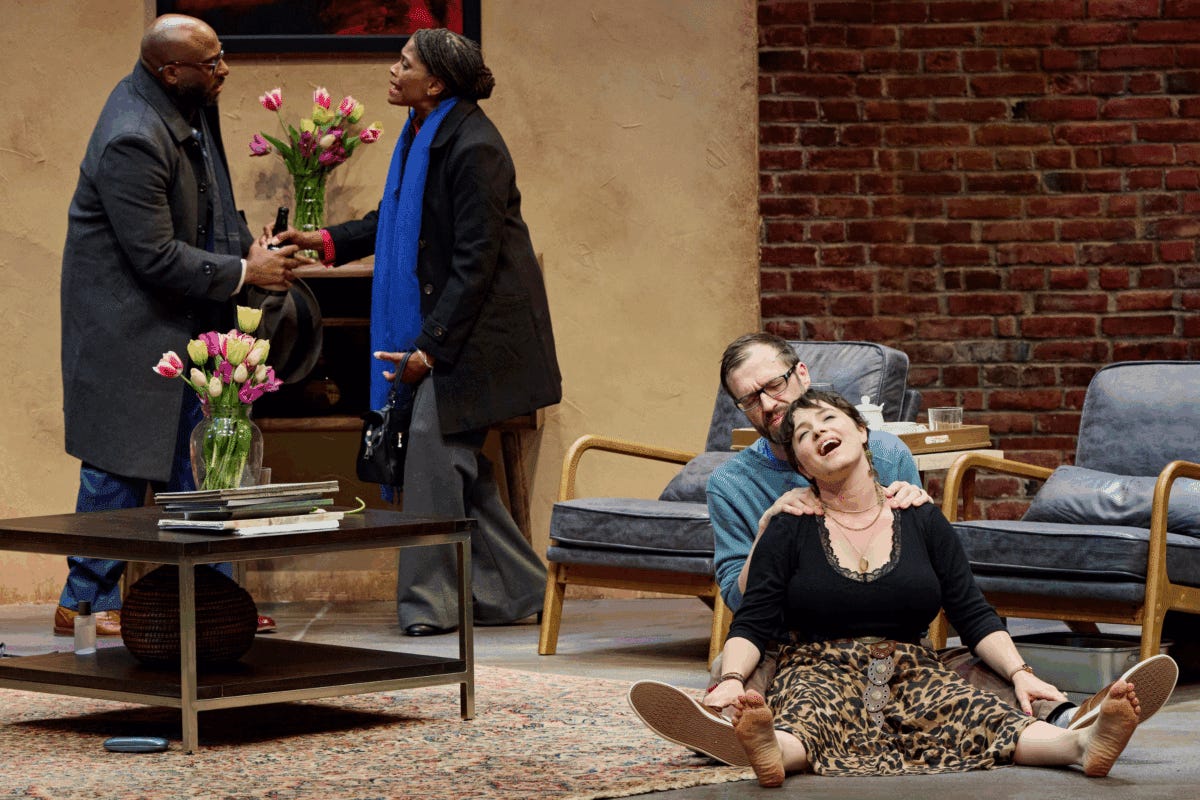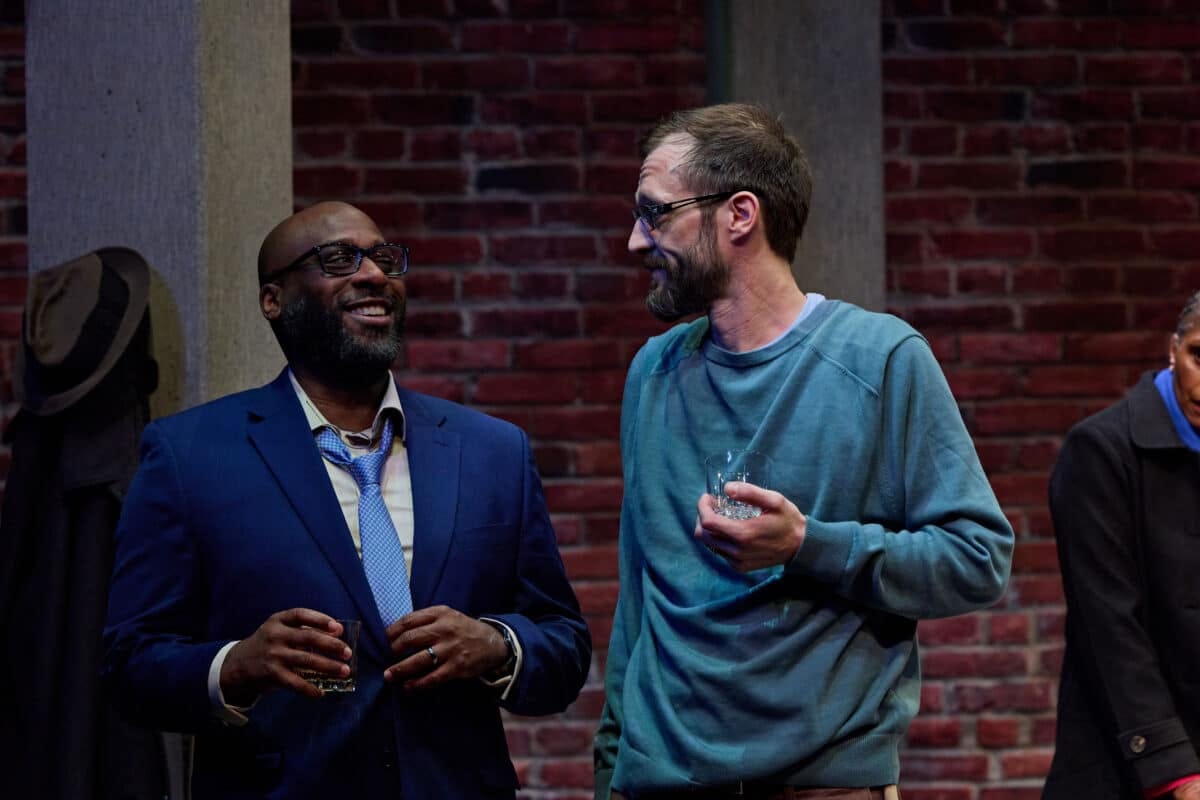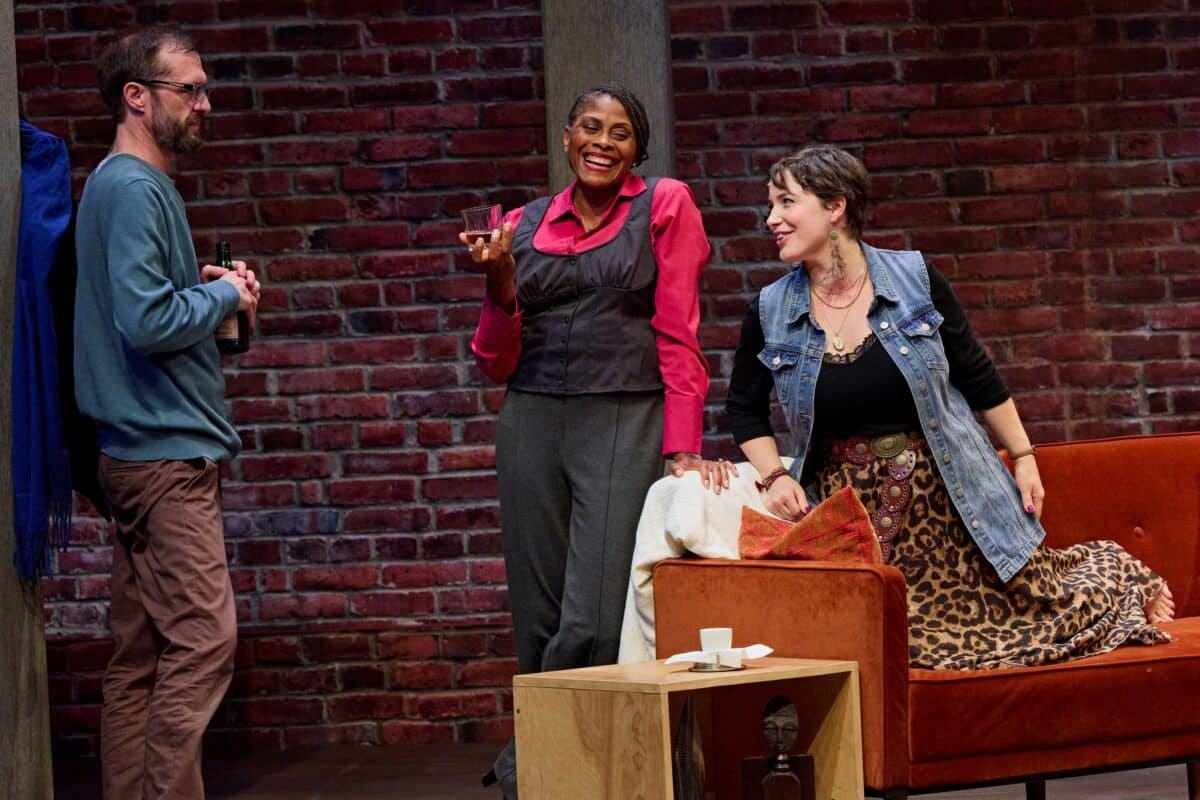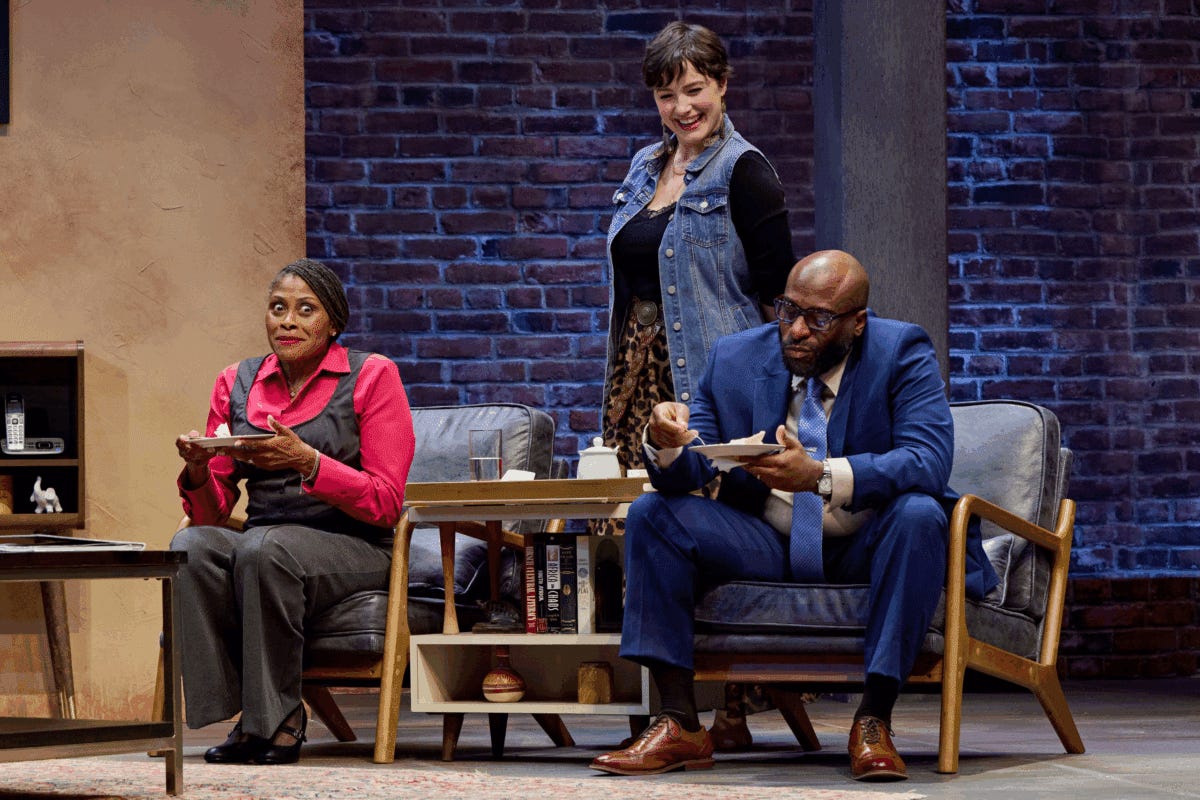When Civility Crumbles: A Review of "God of Carnage" at the Arkansas Rep
How a Bold Casting Choice Unveiled New Depths in Yasmina Reza's Dark Comedy
Seeing God of Carnage at the Arkansas Repertory Theatre last night was a truly captivating and thought-provoking experience, a testament to the power of local theater to breathe new life into familiar works. Having seen a different production of this play just a few months prior, I was struck by how entirely distinct this rendition was, transforming what I thought I knew about Yasmina Reza’s dark comedy into something wholly unique and unexpectedly resonant.
The most immediate and impactful difference was the casting. In the previous production I attended, both couples were white. Here, the roles of Annette and Alan were brought to life by Verda Davenport and Wendell B. Franklin, a Black couple, while Kelsey Claire and Greg Myhre portrayed Veronica and Michael, a white couple. This seemingly simple casting choice was anything but. It introduced a profound, underlying tension that eventually erupted into direct conversations about parenthood, the societal expectations placed upon them and the very different ways Black and white parents might present themselves, and their children, to the world.
Kelsey Claire’s portrayal of Veronica was particularly striking in this context. Veronica is presented as this incredibly worldly, knowledgeable, almost "hippie-dippy" artistic woman. When she proudly declared, as she does in the show, that she "knows everything about Africa," it landed with a poignant weight, almost an unconscious microaggression, directed at Annette and Alan. This comment, in particular, created a palpable layer of tension that was completely absent from the all-white production I had seen before. It wasn’t just about clashing personalities; it was about clashing cultures, perceptions, and deeply ingrained societal biases. This unique dynamic was a welcome and incredibly intelligent addition to the play, making it feel fresh and increasingly relevant.
Greg Myhre, as Michael, delivered a truly unique and surprisingly comedic performance. His physical presence – tall and lanky – made his eventual eruption into a hyper-masculine, almost "Neanderthal-like" character all the more unexpected and hilarious. He didn't initially seem like the kind of man who would openly express disdain for parenthood, lamenting how kids "suck you dry" and make you "regret everything." Yet, his ability to embody this character, to transition from a seemingly mild-mannered man to someone so overtly dismissive of his wife's ideals and the entire situation, showcased the quality of his skill. He truly brought that character to life in a way that defied initial expectations, making his comedic timing all the more effective.
Verda Davenport, as Annette, was, once again, nothing short of spectacular. I had been enamored with her talent since seeing her in Spring Awakening last year, and she continued to impress in God of Carnage. Her dynamic range, her impeccable comedic timing, and her ability to portray the slow, agonizing build-up of suppressed emotions – quite literally – was masterful. You could feel her internal struggle, her simmering frustration with Alan's complete disregard for the escalating chaos, until it finally burst forth in a memorable and truly visceral way.
Wendell Franklin, as Alan, was equally wonderful. His character's almost constant addiction to his phone throughout the entire show was executed flawlessly. It flowed so seamlessly into the conversations, never feeling forced or distracting, but rather serving as a constant, aggravating undercurrent to the unfolding drama. Both Davenport and Franklin, as a duo, were fantastic, especially in the context of this production.
Indeed, the entire cast of four truly shone. God of Carnage is, in my opinion, not an easy show to perform. There are no scene transitions, no lighting changes to break the tension. It’s 90 straight minutes of pure, unadulterated dark humor as you watch these two couples slowly, and then very quickly, tear each other apart over their conflicting worldviews and individual identities. The choice to cast a white couple and a Black couple, and crucially, to present the Black couple as the more "well-to-do" pair, was an inspired decision by director Zack Steele. It cleverly subverted stereotypes that audiences might consciously or unconsciously bring into the theater. Alan and Annette, as the seemingly more successful couple, presented an interesting foil to Veronica and Michael's assumptions.
There was a particularly potent moment when Veronica and Michael began to dismiss Alan and Annette as "fake people," "phony," and not truly caring. To hear these accusations, especially coming from a white man at that moment, resonated deeply. It felt belittling, demeaning, and eerily mirrored real-world conversations where the achievements and narratives of Black individuals are often dismissed or discredited. The subtle yet powerful commentary added another layer of depth and realism to the play, making it far more than just a domestic squabble.
Overall, the production as a whole was incredibly well done and uniquely different from what I had experienced before. I had wondered how the set designer, Dan Robinson, would manage to make such a large stage at the Arkansas Repertory Theatre feel like a confined apartment, fearing it might end up looking like a sprawling "Friends" or "How I Met Your Mother" set. However, the production team and set design masterfully crafted the space. The clever use of a "mantle" area, allowing characters to disappear behind it, retrieve props, and simulate going to the bathroom or the kitchen, made the apartment feel much larger than its actual on-stage footprint, without the need for extensive set building. It created the illusion of a bigger space while maintaining the necessary intimacy and claustrophobia that the play demands.
Not only very well done but also remarkably tactful in its execution. I wholeheartedly recommend it to anyone seeking a compelling and thought-provoking theatrical experience. The conversations between Annette and Alan and Veronica and Michael are incredibly real, touching upon themes of race, class, and societal expectations that resonate deeply. While the previous production I saw did well in its own right (shoutout to my GoC friends turned Loonies), this rendition at the Arkansas Repertory Theatre was dynamically different and equally well-executed. It truly goes to show how revisiting a play in a different space, with a different vision, can offer an entirely new and worthwhile perspective.
Short Synopsis:
Two sets of parents, the Novaks (Veronica and Michael) and the Raleighs (Annette and Alan), meet in the Novaks' living room to calmly discuss a playground incident where the Raleighs' son hit the Novaks' son with a stick, knocking out two of his teeth. What begins as an attempt at civilized reconciliation quickly devolves into a hilarious yet brutal unraveling of civility. Fueled by wine and increasingly frayed nerves, the parents shed their polite facades, revealing their true, often ugly, individualistic impulses and clashing worldviews. The dark comedy hilariously exposes the fragile rules of neighborly decorum and the raw, untamed humanity bubbling beneath the surface, exploring themes of parenthood, marriage, societal expectations, and the thin veneer of polite society. This production specifically adds a layer of racial tension by casting a Black couple and a white couple, further exploring power dynamics and stereotypes.
Performance Schedule: Wednesdays and Thursdays @ 7 pm, Fridays @ 8 pm, Saturdays @ 2 pm & 8 pm, Sundays @ 3 pm June 18-19- Previews June 20-29- Performances Saturday, June 28- Audio-described performance. Please contact Sandee Pinkstaff at creativedescriptions@gmail.com for more information. Tickets from $25, with discounts available for groups, seniors, students, educators, and military.
If you’ve considered having your voice heard and helping shape the continuing growth of this Substack, take a moment out of your day to fill in the survey below!


